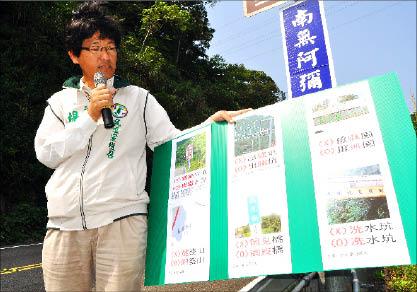Yiong Cong-ziin (楊長鎮), director of the Democratic Progressive Party’s (DPP) Hakka affairs department, yesterday urged the government to conduct a thorough review of road signs for Hakka place names, saying they are often written using incorrect characters that significantly alter their meaning.
“Driving around Miaoli County, you will find road signs set up by either the county government or the Directorate-General of Highways using the wrong characters for these Hakka places,” Yiong said by telephone. “This shows the government’s lack of care and a disrespect for local culture.”
What’s more, these wrong signs often alter the original meaning of the names of those places, with this wrong information being passed on to visitors and the younger generation, he said.

Photo: Peng Chien-li, Taipei Times
“For example, the Xie’ai Ancient Trail (楔隘古道) in Miaoli’s Shitan Township (獅潭) has been written as ‘Xi’ai Ancient Trail’ (錫隘古道) for decades,” said Yiong, who is also running as the DPP’s legislative candidate in Miaoli County.
“‘Xie’ai’, or ‘shiap-ai’ in Hakka, refers to a supportive post placed between major defensive posts along the boundary between the Aboriginal domain and non--Aboriginal domain in the past when ethnic tensions were high,” he said.
However, writing it out as “xi’ai” (錫隘) might lead some people to think that it used to be a tin mine because the character “xi” (錫) means “tin,” Yiong said.
There’s also a mountain in Dahu Township (大湖) called Yaoposhan (鷂婆山), meaning “mountain of eagles,” because it’s a place frequented by eagles, he said.
“Yaopo” is pronounced as “yo’po” in Hakka.
However, the official road sign uses the character “yao” (耀) instead of “yao” (鷂), which is pronounced the same way in Mandarin, but are two different characters that differ in meaning, Yiong said.
“The government should make an effort to survey all Hakka place names and correct all the mistakes to better preserve local culture,” he said.
At a separate setting, Chen Ban (陳板), a long-time researcher and advocate for the preservation of Hakka culture, said that he fully supported the idea that official signs should carry the original and correct place names, as a way to pass on the culture and history of a place.
Chen said he heads a project that has been conducting a survey of Hakka place names for six years now for the Council for Hakka Affairs.
“I would like to call on the council to take action and change these road signs, especially as we’ve been doing this project for six years now,” he said.

A preclearance service to facilitate entry for people traveling to select airports in Japan would be available from Thursday next week to Feb. 25 at Taiwan Taoyuan International Airport, Taoyuan International Airport Corp (TIAC) said on Tuesday. The service was first made available to Taiwanese travelers throughout the winter vacation of 2024 and during the Lunar New Year holiday. In addition to flights to the Japanese cities of Hakodate, Asahikawa, Akita, Sendai, Niigata, Okayama, Takamatsu, Kumamoto and Kagoshima, the service would be available to travelers to Kobe and Oita. The service can be accessed by passengers of 15 flight routes operated by

Alain Robert, known as the "French Spider-Man," praised Alex Honnold as exceptionally well-prepared after the US climber completed a free solo ascent of Taipei 101 yesterday. Robert said Honnold's ascent of the 508m-tall skyscraper in just more than one-and-a-half hours without using safety ropes or equipment was a remarkable achievement. "This is my life," he said in an interview conducted in French, adding that he liked the feeling of being "on the edge of danger." The 63-year-old Frenchman climbed Taipei 101 using ropes in December 2004, taking about four hours to reach the top. On a one-to-10 scale of difficulty, Robert said Taipei 101

MORE FALL: An investigation into one of Xi’s key cronies, part of a broader ‘anti-corruption’ drive, indicates that he might have a deep distrust in the military, an expert said China’s latest military purge underscores systemic risks in its shift from collective leadership to sole rule under Chinese President Xi Jinping (習近平), and could disrupt its chain of command and military capabilities, a national security official said yesterday. If decisionmaking within the Chinese Communist Party has become “irrational” under one-man rule, the Taiwan Strait and the regional situation must be approached with extreme caution, given unforeseen risks, they added. The anonymous official made the remarks as China’s Central Military Commission Vice Chairman Zhang Youxia (張又俠) and Joint Staff Department Chief of Staff Liu Zhenli (劉振立) were reportedly being investigated for suspected “serious

Taiwanese and US defense groups are collaborating to introduce deployable, semi-autonomous manufacturing systems for drones and components in a boost to the nation’s supply chain resilience. Taiwan’s G-Tech Optroelectronics Corp subsidiary GTOC and the US’ Aerkomm Inc on Friday announced an agreement with fellow US-based Firestorm Lab to adopt the latter’s xCell, a technology featuring 3D printers fitted in 6.1m container units. The systems enable aerial platforms and parts to be produced in high volumes from dispersed nodes capable of rapid redeployment, to minimize the risk of enemy strikes and to meet field requirements, they said. Firestorm chief technology officer Ian Muceus said